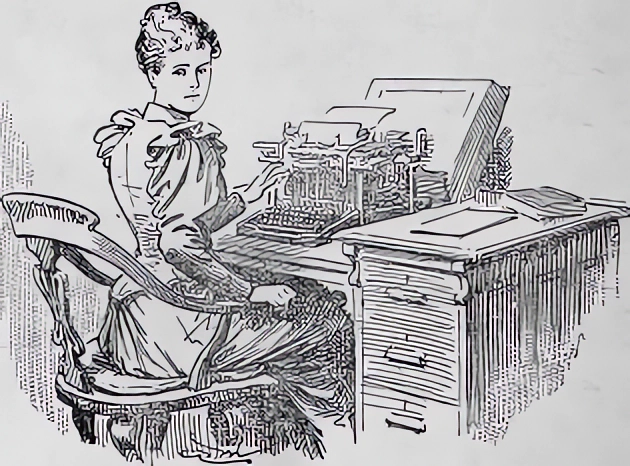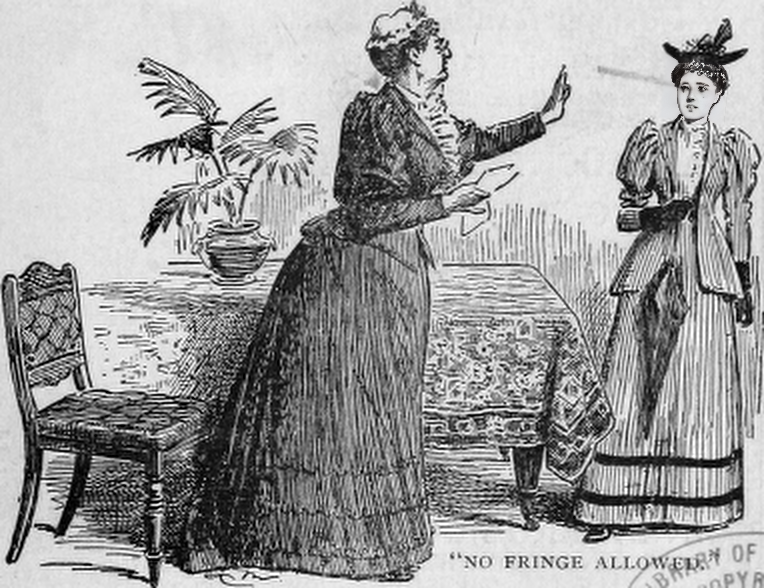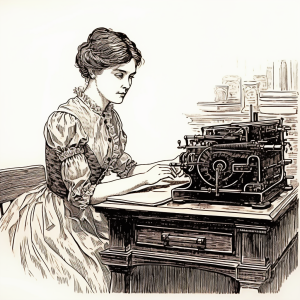CHAPTER II.
SEEKING A SITUATION.

“Seeing your advertisement in the morning paper, wanting a home and friendship of a friend, I want a young person to assist me in the up-stairs duties of a first-class lodging-house, to look after and see and do all that is necessary, and take entire care and responsibility of the same. You would have to wear caps and aprons of course, when anyone was in the house, but not otherwise; and I would do anything for your comfort if only you would study me. I have a young daughter of my own, but she prefers to go to business, and will not work in the house, and I want you to take her place.”
All this was very flattering, and showed the esteem in which the lady held me; but I felt that the entire care and responsibility of a lodging-house, besides the duty of being a daughter to anybody, would be too great a weight on my shoulders.
Another writer assured me that I should find her a considerate mistress, and said that she had always been told that she spoiled her maids by considering them too much, which, she began to think, was true. Many offered higher wages than those I had asked for, and a few thought my terms too high, on account of my probable inexperience. A young matron at Clapham Common was sure I should suit her. I would have the house-work to do and must mind a five-months’ baby. If I was a nice person, I would be happy in the situation. She could not give over £12. The number of women with babies to mind seemed very numerous. The wife of a colonel wished to know if I would do the pocket-handkerchiefs and stockings each week for herself and three daughters, besides attending to the known duties of a house-parlourmaid. Somehow, I was convinced that this was more than I ought to undertake. Mrs. Black, of Hyde Park Gate, required a housemaid who must be a good dressmaker. She requested my photo with full particulars. No agent need apply. Windows and a little washing to be done. (Did Mrs. Black forget that there is a law against allowing women-servants to wash windows?) Mrs. Smith, living near Oxford Circus, wanted a trustworthy, reliable, clean girl to do the work of a private house. She had a domesticated daughter, three sons and a husband, and would want the washing done at home. Wages £1o, or £12 with no beer. Just where the clothes would be dried after the washing was done at home was a source of conjecture in my mind, and I doubted my ability to put a proper gloss on the shirt-fronts of the three sons and the husband.
Kind and thoughtful letters were numerous. Mrs Burns, living in a flat near Portland Place, wrote that she desired a house-parlourmaid who, in conjunction with the cook, would do the work of the flat. I could have a separate bedroom, and she would do everything in her power to make me feel that I was not without friends and home. A very nice letter came from Thames Ditton, which ended by saying “If you think my situation at all what you are seeking, will you give me some references? and, as I am a stranger to you, I will send references in return.” This was the only instance in which the employer spoke of giving references, although I was always required to furnish them. Just why a “character” should be demanded on one side only is beyond my comprehension. Why should not the give-and-take plan be followed in such cases? Is not a mistress likely to prove as unmanageable as a servant?
An enterprising City man wrote that he was looking out for a young lady who would invest capital to build up a toy trade in a neighbourhood where there was no opposition. He would be pleased to hear if I was disposed to come to terms. Then I opened a letter couched in this language:—
Dear Miss, — Seeing your advertisement, I am moved to write and say that I admire your pluck and am glad to know there is at least one young woman with sense enough to see that there is no disgrace in domestic labour. I would like to marry a girl like you, if you are not too old or ugly, which I do not believe you are. Please state age, complexion, height, temperament, and personal appearance, and tell me if you would accept for a husband an honest mechanic, aged 28, and earning £200 a year. If so, give me your address, and I will come and see you with all honourable intentions. It is much better for a girl like you to be married and have a protector than to be a housemaid.
In my opinion, the writer of that epistle is a prize in the matrimonial market, and I should be glad to give his name and address to any young woman who can answer his requirements and thinks she would be able to appreciate the situation.
There were several replies from bachelors and widowers wanting “companion-working-lady house keepers.” They all assured me that there was very little work to be done. Mr. Alexander Macfarlane, of Glasgow, wished for particulars in regard to age, experience, and qualifications for his situation as house-parlourmaid. He stated that he was a single gentleman, whose establishment consisted of cook-housekeeper, kitchenmaid, and house-parlourmaid — all English. Each servant had a separate room. He desired to know if I had any experience in valeting, if I understood lamps, and how my knowledge of silver-cleaning and waiting at table had been gained. I must give particulars as to last two situations, and reasons for leaving them. What allowance would I require in addition to wages for finding myself in beer, tea, sugar, and washing? He requested my photograph, which he would return at once, and, if appearance and qualifications were satisfactory, he would arrange for an interview.
In spite of Mr. Macfarlane’s insinuation that I might need an extra allowance for beer-money, I conceived the greatest admiration for him, because he was the only man who took me at my word, and offered me a place as a regular servant. In reply, I wrote him some particulars, stating that I was a teetotaller, had never been out to service, and could only give reference as regarded my respectability and honesty, but felt competent to undertake the work he mentioned, including the valeting. His answer was straightforward. He feared that a young woman of my bringing up and education would not find it pleasant to work in his house under the supervision of a cook-housekeeper. It would be better for me to go in a small family where there was a lady at the head of the household. If he heard of any place he thought suitable for me, he would write immediately, as he felt interested in me and desired to help me.
Would that there were more Alexander Macfarlanes in the world!
About half the letters contained stamps for reply, and I conscientiously wrote to every person who enclosed a stamp. The story I told of my circumstances was a simple one and as near the truth as I thought politic to make it. I was an orphan and almost alone in London, well educated, but my education was such as did not fit me for anything in particular. I could not obtain employment in the City, as I did not write a good hand, and, not understanding the languages or music, found it difficult to get a position as governess. Nothing was left me but domestic work, which I understood perfectly. I thought it no disgrace to be in service, and had determined to get a place as housemaid or parlourmaid, asking no favours and desiring only wages for services rendered. I gave the Camberwell address, and signed my letters Elizabeth Barrows. In some cases I received no answers, but about fifty appointments were made for me to call in various parts of London. Mrs. Clifford-Morris, who was spending a few weeks in Brighton, asked me to call on her husband, a solicitor, in Chancery Lane, who could then give her particulars in regard to me. She thought she could employ me as useful help in her flat when she returned home. In her several letters she addressed me as “My dear Miss Barrows,” and the sympathetic, delicate manner in which she treated me quite won my heart. I did not call on Mr. Clifford-Morris, as I felt that to enter the service of his wife, knowing that I should remain only a short time, might put her to inconvenience in her household arrangements for the winter and be but small return for her kindness to me. Yet I determined to try to find her such a person as she wanted, and I still hope that I may be able to send her someone who would appreciate the home she has to offer.
On the morning of Friday, September I, I started out in answer to some of the appointments made for that day. My first call was on a Miss Martin, who was at the head of what she described as a “high-class private hotel” in Mayfair. The manservant who admitted me, asked me into the drawingroom, but, realising that henceforth I could no longer lay claim to the title of “young lady,” but must consider myself only in the light of a “young person,” I thought perhaps it would be better for me to remain in the hall, so I sat down on the hat-rack in orthodox servant-girl fashion, and tried to compose myself for the interview. Miss Martin, a pleasant-faced spinster of about forty, soon made her appearance, and asked me up to the drawing-room. She led me to a window, looked me over, and then shook her head, kindly but firmly.
“My dear, you are too little!” was her first exclamation.
“But I am strong, neat, willing, respectable, &c.” I insisted. “Please do not despise me because I am small.”
Miss Martin still looked doubtful; then she commenced to tell me of all the work a housemaid would be expected to do, and afterwards showed me through the house, with a view of discouraging me. I felt that I must say something to convince her of my capabilities, so I ventured to suggest that I could dust the chairs in a much better way than they had been done, and explained to her a new and improved method of making beds. I also informed her that I was able to remove the numerous candle-grease spots with which the carpets were sprinkled, by the application of brown paper and a hot flat-iron to the injured parts. Miss Martin’s face began to light up, and I could see I was making an impression. I went on and discussed learnedly the proper way to polish looking-glasses and shine the tiled fireplaces, while her enthusiasm increased. When I was leaving I gave her the name of my reference, and she promised to write me her decision. What was my disappointment that evening to receive a letter saying she had not written to the reference as she could not help thinking I was too small and delicate to do the work! It seemed that, as soon as my inspiring presence had vanished, she remembered only my diminutive stature.

From Mayfair I went to Grosvenor Square, and met a most formidable-looking lady of the house. She did not ask me to sit down, but commenced at once to read me off a list of the duties to be performed by the parlourmaid, when, suddenly giving me a very scrutinising look, she advanced towards me, and lifting her hand warningly, ejaculated, “No fringe allowed!” I sprang back, and instinctively put my hand to my forehead as a protection, fearing she might brandish a pair of scissors before me and barber me then and there. What! put back my fringe! I had entirely overlooked the fact that many servants were not allowed to wear a fringe.
“I couldn’t part with it, ma’am,” I answered in humble and trembling accents. Then I made a frightened retreat, and walked in the direction of Regent’s Park. No fringe, indeed! Was it possible that one of my own sex could be so cruel as to wish to deprive me of my halo? Besides, my caps were not becoming without a fringe. Liberty! Independence! I began more fully to understand the meaning of the words, and I wondered if, after all, I should not end by joining “The Independent Young Ladies’ League.”
I rang the bell of a large house in Marylebone Road, and was admitted to the presence of Mrs. Green, who had wired me to call that morning. She was an elderly woman, tall and stately, with a kind face which quite reassured me. She asked me to sit down and then to stand up.
“I am afraid you will not do. You are so short. You see, a parlourmaid must have long arms in order to reach things on the table, and a housemaid should also be tall; else how can she put the linen away on the top shelves and wash the looking-glasses in the drawing-room? Why do you not try to get a place as nurserymaid or governess to small children?”
I did not feel at liberty to say just why I did not do this. I only said that I knew so little about children that I was afraid to undertake so great a responsibility.
“Well,” said she, “you would not suit for my house — the work is too hard for you — yet I must try to help you. It is so sad for a girl to be alone in this great city. I was just eating my luncheon. Will you have a nice chop and cup of tea? In the meantime I will see what I can do for you.”
I was not hungry, but I went with her to the dining-room while she finished her meal, and answered as truthfully as I could the questions she put concerning myself.
“Can you sew?” she asked.
My thoughts turned involuntarily to the many times I had tried to learn the art of needlework, which had resulted only in pricked fingers and a bad temper. Once I remembered to have been able to get through a little patchwork. Dared I say that I could sew? Then I answered, “Yes, ma’am, a little,” inwardly praying that she might never discover how very little that “little ” was. She went to her desk, wrote a note, and handed it to me sealed. “This is a letter to a friend of mine in South Kensington, a lady who keeps a high-class employment agency. Go to her this afternoon, and she may be able to get you more congenial work than that of an ordinary servant. Take the Underground. Here is your fare.”
To my horror she slipped a half-crown piece into my hand. I protested that I had a little money, and could not think of taking it, but she insisted, and I felt I could not refuse it without exciting her suspicion. “Good-bye. Write me how you get along. I shall always be interested in you,” and with a motherly pat on the head she dismissed me. I wandered along Marylebone Road with the letter and the money, feeling like a culprit. Might I not be arrested on the charge of obtaining money under false pretences? Would the excuse that I was a journalist, doing evil that good might come, protect me from the law? The coin almost burned a hole into my glove. Just then a woman, grinding a small organ, passed me, and I thrust the money into her hand and rushed away before she could overwhelm me with thanks. I broke the seal of the letter, and read:—
Dear Mrs. , — The bearer interests me. Her case seems a sad one. Can you advise her how to get work? I know you won’t mind the trouble of doing anyone a kindness. She seems so forlorn, alone in a large city.
God forbid that I should ever grow pessimistic, and think womankind cold and heartless, when such women as Mrs. Green live in the world! Surely, future generations of working girls will rise up to call her blessed!
I spent a week in my search for a situation. Among the people I met, a Thackeray or a Dickens would have found abundant material for many characters in many books. I called on bachelors, widowers and widows, ladies of title, members of the upper and middle classes, actresses, literary women, and boarding-house keepers. They all agreed that it was the proper thing for educated girls to go out to service, and that a great change must be brought about in the class of domestics to be employed. However, the majority of them found some objection to giving me a trial. A woman on Cambridge Terrace offered me a place as parlourmaid in a house where twenty lodgers were taken, and I would have accepted it but for the fear that at the end of the week’s trial she was to give me I would be too much reduced in flesh and spirit to linger long on the earth, for each of the twenty lodgers must have his or her meals carried up-stairs on a tray. Another boarding-house keeper was so sorry I had not;£100 to invest in the business, as she would have liked to have taken me into partnership. In Gloucester Road a Mrs. Weldon, living in a small house, with only herself and husband in family, said she liked my appearance and manner, but that I did not give her enough particulars concerning my private history and family affairs. I thought her suspicious manner of treating me far from delicate, especially as I gave her the name of a well-known London lady as reference, who, I informed her, had known me from childhood. Had I been an ordinary applicant for a situation, I should have attempted to give her a lesson in politeness and considerateness for the feelings of others. It is neither consistent nor just that a young woman applying for a place as servant should be subjected to such a catechism as that through which this woman put me. It is quite as honourable for servants to listen at keyholes as for mistresses to attempt this prying into personal secrets.
At last I found an engagement. Mrs. Allison, residing in a large house in the neighbourhood of Portman Square, wrote to inform me that my reference was satisfactory, and she would give me a place as housemaid. She ended by saying—
“I think I shall be able to smooth over many of the rough places for you, and give you a comfortable home.”
She would expect me on the evening of September 14. During the interval I made a close study of a little book entitled “Servants’ Duties’ and endeavoured to make myself proficient in all that pertained to my chosen work. I became quite an expert in the use of the words “ma’am” and “sir.” At the appointed time I presented myself and my handbag at the door of the Portman Square mansion, ready to enter my first situation as housemaid.



